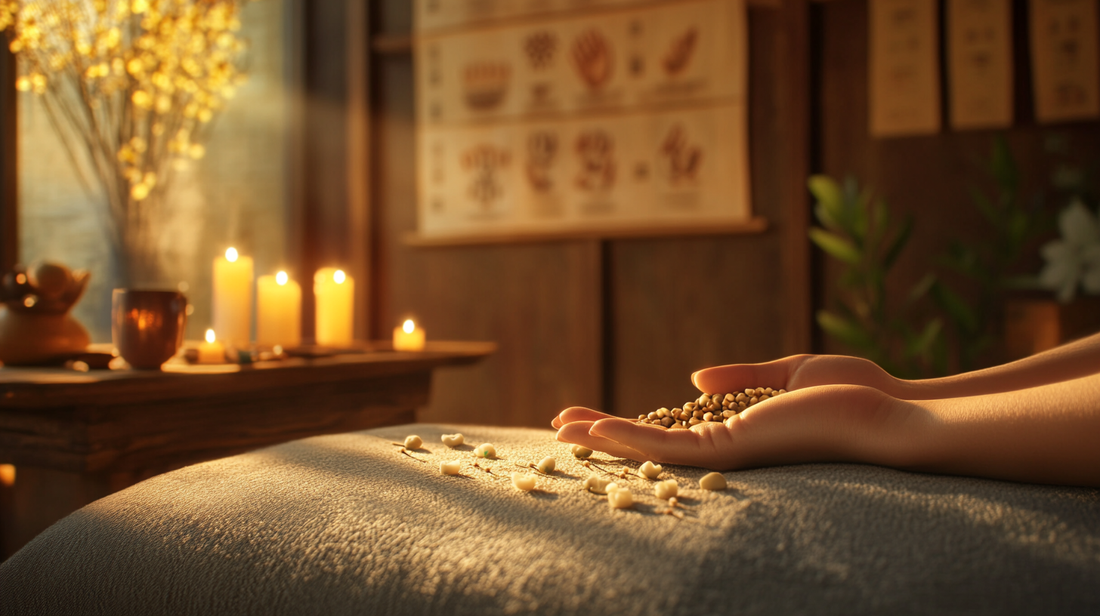
3 Acupuncture Points to Help You Sleep
Share
Introduction
Struggling with poor sleep can affect every area of your life—from focus and energy to mood and immune health. In Traditional Chinese Medicine (TCM), insomnia is seen as an imbalance in your internal energy system, especially involving the Heart, Liver, Kidney, and Spleen.
Instead of just suppressing symptoms, acupuncture works by regulating these systems and calming the Shen (spirit). Certain acupuncture points are particularly effective for improving sleep—whether it’s falling asleep faster, staying asleep, or waking feeling more rested.
In this blog, we’ll explore the top 3 acupuncture points known for promoting better sleep, the TCM theory behind them, how they’re used in clinic, and how they fit into a full treatment plan at Vital Duo.
Understanding Sleep in Chinese Medicine
What Does Healthy Sleep Require?
In TCM, restful sleep requires:
- Harmonised Yin and Yang balance
- Sufficient Heart Blood to anchor the Shen
- Clear and smooth Liver Qi flow
- Nourished Kidney Yin to cool Heart Fire
When one of these systems becomes deficient or stagnant, the Shen becomes agitated, leading to:
- Difficulty falling asleep
- Waking at night
- Vivid dreams or nightmares
- Restlessness or light sleep
"To treat insomnia, one must calm the Shen and balance the internal organs." — Huangdi Neijing (Yellow Emperor’s Inner Classic)
1. Shenmen (HT7) — Calm the Heart
Location:
- On the wrist crease, at the ulnar end of the transverse crease of the wrist, in the depression on the radial side of the tendon of flexor carpi ulnaris
Why It Works:
-
Main Point to Calm the Shen
- Tonifies Heart Blood and Yin
- Clears Heart Heat and reduces anxiety
Best For:
- Difficulty falling asleep
- Waking with palpitations or anxiety
- Nightmares
TCM Insight:
The Heart houses the Shen (spirit). If Heart Blood is deficient or if there’s excess heat, the Shen becomes unanchored. HT7 nourishes the Heart and re-establishes calm.
Journal of Chinese Medicine (2021): Stimulating HT7 increased parasympathetic activity and decreased nighttime cortisol in insomnia patients.
2. Anmian — Peaceful Sleep Point
Location:
- Behind the ear, midway between SJ17 and GB20, slightly posterior and superior to the mastoid process
Why It Works:
- Calms the Shen and settles anxiety
- Relieves dizziness, tinnitus, and dream-disturbed sleep
- Commonly used for general insomnia
Best For:
- General sleep disturbances
- Overthinking at night
- Tension headaches affecting sleep
TCM Insight:
Although Anmian is an extra point (not on a traditional meridian), it's widely used for its tranquilising effects. It connects to areas influencing the Heart and Gallbladder, two organs tied to emotional stability.
Acupuncture in Medicine (2020): Use of Anmian increased total sleep time and sleep efficiency in clinical trials compared to control groups.
3. Sanyinjiao (SP6) — Harmonise Yin
Location:
- On the inner leg, 3 cun (approx. 4 fingers) above the tip of the medial malleolus, behind the tibia
Why It Works:
- Tonifies Spleen and Kidney
- Nourishes Liver and Kidney Yin
- Regulates menstruation and calms the mind
Best For:
- Night sweats
- Waking between 1–3 am
- Insomnia related to hormonal imbalance or anxiety
TCM Insight:
SP6 intersects the three Yin channels of the leg (Spleen, Liver, Kidney). It's a master point for nourishing Yin and calming internal excess—especially useful for menopausal or stress-related insomnia.
BMC Complementary Medicine (2022): SP6 acupuncture significantly improved sleep latency and total sleep time in women with perimenopausal insomnia.
How We Use These Points at Vital Duo
At Vital Duo, we rarely use points in isolation. Instead, we:
- Conduct a full consultation (tongue, pulse, sleep history)
- Choose points based on individual TCM diagnosis
- Combine calming, nourishing, and harmonising points
- Integrate with herbal medicine and sleep hygiene coaching
Sample Treatment Plan:
Patient: Female, 38, poor sleep, hot flashes, and night anxiety
Diagnosis: Heart and Kidney Yin deficiency with Liver Qi stagnation
Acupuncture Points: HT7, SP6, Anmian, KI3, LV3
Herbal Formula: Tian Wang Bu Xin Dan
Lifestyle Adjustments: Bedtime breathwork + no screens after 9pm
Results after 6 sessions:
- Fell asleep 30 minutes faster
- Reduced waking episodes
- More grounded and less anxious during the day
Complementary Techniques
Herbal Medicine
- Suan Zao Ren Tang for Liver Blood and sleep
- Tian Wang Bu Xin Dan for Heart-Kidney Yin deficiency
Facial Gua Sha
- Calms the Shen
- Helps release emotional tension in the jaw and brow
Diet & Lifestyle
- Warm, grounding foods (avoid spicy or greasy meals at night)
- Regular sleep schedule
- Journaling or meditative reflection in the evening
FAQs
Can I use these points myself at home?
Yes—gentle acupressure with slow breathing can help. But professional acupuncture creates deeper regulation.
How fast will I feel a difference?
Some patients report better sleep after the first session. Chronic patterns usually improve over 4–6 sessions.
Can I combine acupuncture with sleep supplements?
Yes—but always consult with your practitioner to avoid interactions with herbs or medications.
Are there side effects?
Minimal—some light soreness or temporary fatigue after a session. Most people feel relaxed and calm.
Final Thoughts
Acupuncture offers a deeply effective, non-sedating solution for sleep issues. By targeting key points like HT7 (Shenmen), Anmian, and SP6 (Sanyinjiao), it restores the body’s natural rhythm, nourishes Yin, and calms the spirit.
Academic References
- Journal of Chinese Medicine. (2021). Shenmen Point and Cortisol Reduction
- BMC Complementary Medicine. (2022). SP6 and Sleep Quality in Women
- Acupuncture in Medicine. (2020). Clinical Outcomes of Anmian for Insomnia
- Chinese Herbal Medicine Materia Medica (2011). Herbs and Formulas for Shen Disturbance
